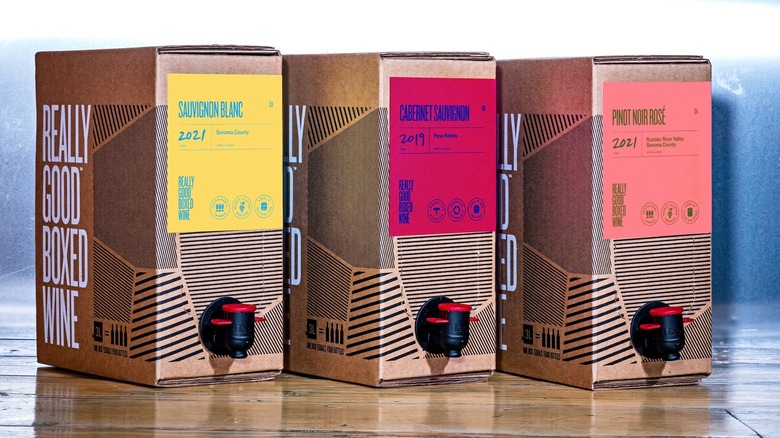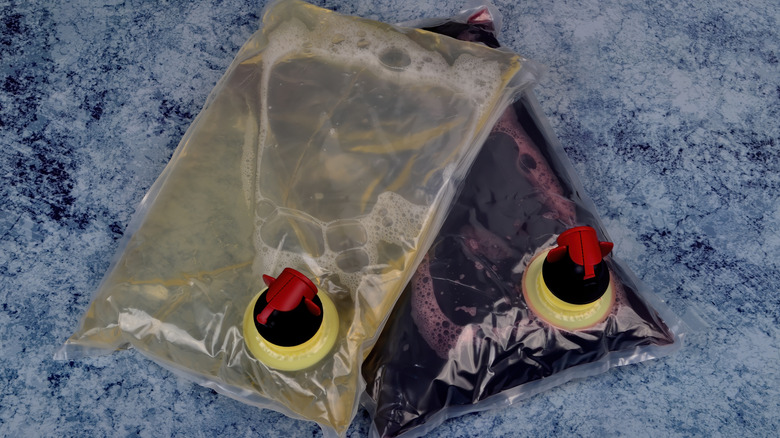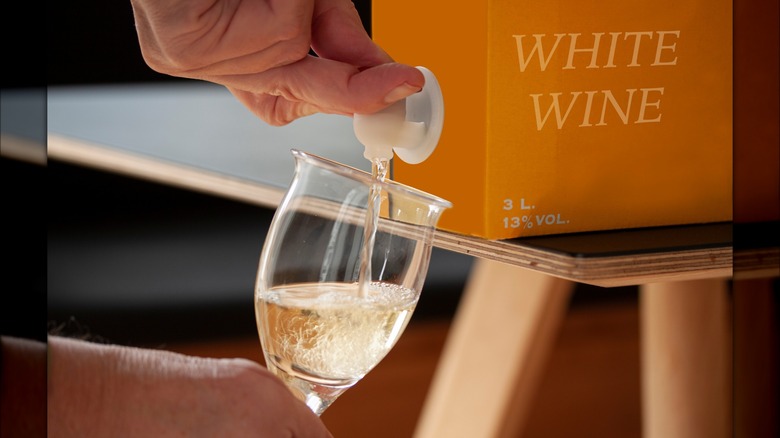How Long You Have To Drink A Box Of Wine After Opening It
There's a certain prejudice against boxed wine. Squeezed into bags inside cardboard boxes with little taps to pour the liquid out, it's often dismissed due to its packaging — a far cry from the perceived sophistication of bottled wine. Additionally, boxed wine's relatively low price tag has contributed to its reputation for being presumably inferior in quality — a wine myth that should be debunked. However, boxed wine holds an undeniable advantage over its bottled counterparts: it's more affordable, available in larger quantities suitable for big gatherings, and, importantly, it lasts for weeks (weeks!) even after being opened.
Unlike bottled wine, which tends to have best-by dates, unopened boxed wine comes with expiration dates. Although the exact time frame varies depending on the product, boxed wine generally spoils within 12 to 18 months. In contrast, bottled wines can last anywhere from a year to two decades past their best-by dates. Once opened, however, boxed wine offers a significant advantage: It can last up to six weeks, whereas bottled wine may begin to spoil within a day in some cases. That said, it's advisable to consume the remaining boxed wine within two to three weeks to enjoy its optimal freshness.
Why does boxed wine last longer than bottled wine after opening?
The reason why boxed wines last longer than bottled wines after opening lies in their packaging. Open wines begin to spoil due to exposure to oxygen, which, when properly controlled, is key to allowing wines to age and breathe. However, the same oxygen can cause bottled wine that's been opened and exposed to air for more than a day to spoil, after which you might notice signs that your bottle of wine has gone bad, such as a sour, bitter, or vinegary taste.
Boxed wine lasts longer after it is opened because its packaging reduces exposure to oxygen. For one, boxed wines have plastic spigots that create better, more airtight seals. More importantly, the boxes are designed to allow the plastic bag containing the wine to deflate and collapse as the liquid is poured out, removing any lingering air with it.
However, it's important to note that while bottled wines can age up to a certain point when left unopened, this is not the case with boxed wine. Plastic is a porous material, which means that oxygen — no matter how little — can still pass through it, even if it isn't opened. Boxes only slow the wine's exposure to air, not eliminate it entirely, which is why boxed wines can expire even if left unopened.
How to store boxed wine properly
The key to prolonging your opened boxed wine's quality as long as possible is proper storage. You might keep the partially consumed box at room temperature, or consider freezing it after opening — though the latter may affect its flavor. Regardless of your stance on the chilled-or-room-temperature red wine debate, the optimal approach is to store all open boxed wines, including reds, in the refrigerator — though there are plenty of bottled red wines that are great served chilled, too. Red wines are ideally kept at temperatures between 50 to 60 degrees Fahrenheit, and whites between 40 and 50 degrees Fahrenheit.
However, the critical factor in storing open boxed wine in the refrigerator is not just the cool temperature; it's the reduced oxygen exposure. As long as this is minimized, boxed wine can remain fresh at room temperature as well, thanks to its packaging, albeit not as effectively as in the fridge. After six weeks, however, it's best to discard the boxed wine, regardless of how it was stored.



